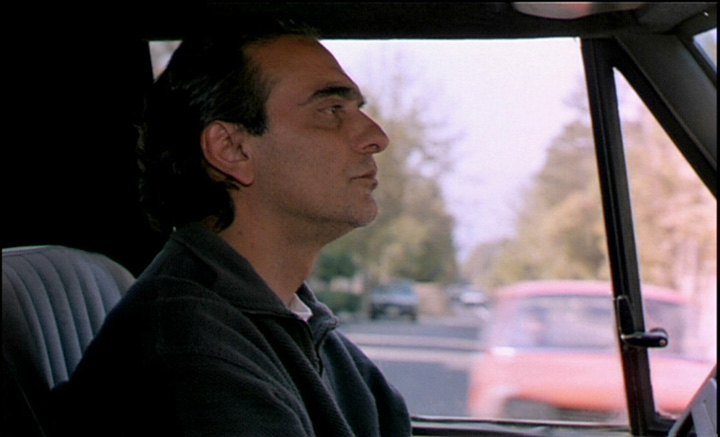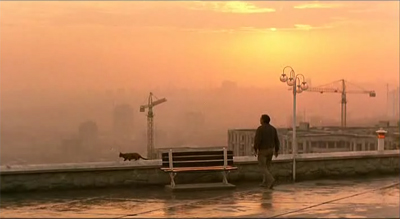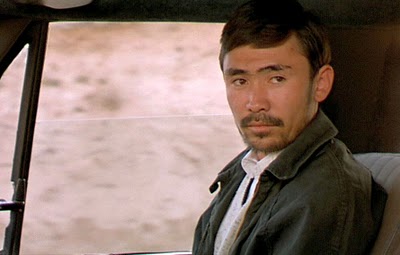From Cinemad No. 3 (2000). Much of this piece makes me blush, and other parts are clearly out of date, but I’m posting this basically “for the record”. -– J.R.
A conversation with film critic Jonathan Rosenbaum by Paolo Ziemba
This being the first article that I’ve written for Cinemad I thought it was more than appropriate to delve into a time where films changed my way of thinking of the world. Rosenbaum was key in this new beginning. Cinemad continues this process. While reading Rosenbaum’s books for research I experienced a sort of nostalgia for the days back when I was broadening my knowledge of cinema. Rosenbaum had opened many doors to a world of cinema that I had never experienced before. With this in mind I would like this article, at the least, to stir the readers to explore what Rosenbaum, and the world of cinema, is more than willing to offer.
Imagine a film critic who travels the world and experiences all cinema. Imagine a critic who is not only moved by cinema because of its beauty, but also because of its importance in the world. Imagine a critic who takes all of this in and then serves it to anyone willing to read.
His name is Jonathan Rosenbaum, film critic for the Chicago Reader. I came across his work in the counter-cultural alternative newspaper just by chance back in the early ’90s as a film student at Columbia College in Chicago. His essays, whether I agreed with them or not, always showed me an opinion based on years of experience which gave me more knowledge of cinema’s history and politics than any class I ever took, with no restrictions.
He has worked for the Chicago Reader for the past ten years, writing short synopses and long reviews with little or no interference from the editors. Rosenbaum has also contributed to several film magazines including Trafic, Written By, Scenario, and Cineaste, and several of his essays have been reprinted in such Italian magazines as Close-Up and Bianco y Nero.
Rosenbaum has also written several powerful books that not only give you insight into the world of cinema and its politics, but insight into the life of a man who is passionate about experiencing everything with open arms.
Rosenbaum says his book Moving Places: A Life at the Movies is “a project that had a personal urgency for me because I wanted to forge the links between two mainly disconnected portions of my life — my childhood in Alabama, and my career as a critic in New York, Paris, London, and San Diego.”
Placing Movies, considered as a companion and sequel to Moving Places, contains a collection of previously published essays for such publications as Sight and Sound, Film Comment, the Chicago Reader and the Monthly Film Bulletin with a dash of previously unpublished personal stories. Movies as Politics is another collection of essays, “looking at not just the political implications of many different kinds of films as statements and processes in themselves, but also at the political aspects of what might be called the challenge of cinema — its aesthetic forms, its narrative tactics, and its patterns of production, promotion, distribution, exhibition and reception.”
Although Rosenbaum grew up watching almost every film released in the 1950s at the Rosenbaum Theaters (which his father managed and his grandfather owned in Florence, Alabama), he did not start out wanting to write film criticism. His original idea was to be a novelist and to write short stories. As a kid he had written a guest column for the Florence Times, ‘reviewing’ the major releases that came to the family-owned theatres, but he was more dedicated to writing his stories and poetry. It wasn’t until he was in graduate school at the State University of New York at Stony Brook that the opportunity to write about films presented itself.
“When I decided I wanted to get out of graduate school and since I didn’t want to get drafted,” Rosenbaum says, “I waited until I was old enough and then I left. This is when somebody offered me a job of editing a collection of film criticism which was perfect only because I wanted a job and I wanted something to do other than graduate school.
“I found that when I started trying to write about film that I was getting that work published,” whereas his earlier novels weren’t getting published.
Getting to spend about one fourth of his time traveling all across the world as a critic, Rosenbaum experiences almost no distinction between what’s work and what’s play. Not having the pressures that most critics have from their editors, Rosenbaum can write as long as he likes about any film that moves him.
“I feel that I’m lucky in the sense that I know very few people who have lives like mine,” Rosenbaum says.
When talking to Rosenbaum about today’s market of reviews, dedicated to focusing on what’s opening this week and telling us what films to avoid and what films are worth seeing, he says he prefers to write critical essays.
“One way to make a distinction between a critical review and a critical essay is how long one has to think about a film and to test certain things out,” Rosenbaum thinks. “I have a friend who is a Dutch film critic who reviewed Movies as Politics some time ago. He said that he thought there was an advantage to for me having a lot of time between when I saw a film at a film festival and when it finally came to Chicago.
“I think he might be right in that respect, and from that point of view it’s like when you’re writing a review, there is more of an element of a gamble. Of course it’s still a gamble even when you’re writing a critique.”
Jacques Rivette once said in a roundtable discussion in Cahiers du Cinema in the 50s that “it’s impossible to really know the ultimate value of something when it comes out.”
Rosenbaum says, “You only find that out over time. So I really think that that’s part of the distinction…that when you’re in a category of reviewing, which is to give consumer advice, that’s a temporary thing. But it also might change. I know my tastes change over certain periods of time. What I might like under certain circumstances I might not like under other circumstances.”
To understand a little bit better as to why people don’t flock to see films by artists pushing the envelope of their medium, Rosenbaum explains why he writes about films that are hard to come by in the United States, if available at all.
“Part of it becomes something like the chicken and the egg problem. How could you ever see certain films that people can’t see if you don’t write about them? Desire is very important. What motivates me as a filmgoer and as a reader is that there are things that I haven’t seen that I want to see, things that I haven’t read that I want to read, and sometimes you have to go to great lengths to get there.”
To give an example of this idea, Rosenbaum talks about a project he’s currently working on dealing with Japanese director Yasuzo Masumura.
“I wrote about Masumura in the Reader after seeing about five of a dozen of his films screened at a retrospective held at Facets Multimedia in Chicago. After seeing these films I got much more interested in him and decided as best I could to see more and more of his work.
“Then I met this really brilliant Japanese graduate student at the University of Chicago [Chika Kinoshita] who happened to have three of his films. The films were without subtitles, but she offered to write these very detailed synopses of them so I could follow the stories. Then, through people I swap videos with in different parts of the world, I put the word out that I was looking for Masumura films. A video, subtitled in English, came to me from Israel, of all places.
“So the point is, if there’s a will, there’s a way. And if you want to write about films that you can’t see, maybe people will start helping you find ways that you can.”
Rosenbaum goes on to state that one of the most important aspects of being a journalist is to draw the public’s attention to things that they might normally miss.
“In the space of a week, a sort of cult for the films of Masumura had built up at the Facets retrospective. I can guarantee you that there are plenty of people in Chicago now who would flock to see any of his films that came to town.”
While giving more attention to these types of “uncommercial” films in his writing, Rosenbaum says that he rarely finds it necessary to give a big Hollywood film a “critic’s choice” in the Chicago Reader.
“If I did, then I would just become part of the flow of that promotion that they’re already spending millions of dollars on, so why should I be part of that? What would be the point?”
Another way, suggests Rosenbaum, to continue spreading the word for films that lack the press they deserve is to have a film society.
“This was an important thing that went on in the sixties,” Rosenbaum says. “People would actually project films in their living rooms, invite people over, smoke a little dope and maybe charge a little bit for admission. There are all types of ways in which culture can get transmitted officially and unofficially, and it seems to me that there could be much more unofficial stuff going on than there is.”
In comparing the differences between American films and films outside the U.S., Rosenbaum takes an interesting angle towards their similarities: “I’ve been thinking more and more over the last few years that nationality is becoming less and less significant. It’s been significant mostly because there are so many films we can’t see that happen to be films from other countries.”
There’s a lot of debate about Iranian cinema, and though director Abbas Kiarostami is Iranian it is the least interesting or important thing about him. This also works with commercial films.
“There was a piece I wrote for the Chicago Reader and it’s arguing that a film like Starship Troopers, which everybody calls American, is not really American,” Rosenbaum says’ “It’s just the way it’s marketed. It’s not directed by an American, it doesn’t tell you anything about American life in particular.
“To give another example of what I mean, I was recently in Japan, and you can go into one of the McDonald’s or Kentucky Fried Chicken outlets in Tokyo and order corn soup. You can’t go into a McDonald’s in the U.S. and order corn soup, but that’s what they like in Japan.”
Rosenbaum carries the argument further, detailing a situation involving an Italian brand of espresso that you get in heated cans from vending machines in Japan called Pokka Expresso. It’s brewed in California yet the only way it can be bought in the states is to go to an Asian grocer.
“How is that Italian? This really gets you thinking about nationalities. Is that American, is that Japanese, is that Italian?It doesn’t really matter. It’s just the labels slapped on them. When people think that McDonald’s is the American way of life, it’s actually not. Not if they’re selling corn soup. This is selling the Japanese way of life.
“It’s as if the real unity that one has in the world is not between groups of one nation, it’s the fact that we’re all subject to the same things that multinational capitalism is doing all over the world. So we have a lot of things in common with people in Taiwan, parts of South America, everywhere! Just because they’re doing the same things in all these places, and you find that there are people who like all the same films in all these places. With the addition of the Internet, there are now ways to actually access these people now, and that’s very exciting!”
A recent development in Rosenbaum’s work, the immediate response he gets via email from countless countries outside of the U.S., stresses this point of similarity across the world.
“A while back I got an email from somebody in Tehran who said, ‘I just read your review of TASTE OF CHERRY that was translated into Persian in an Iranian newspaper that was closed down by the Fundamentalists back in May.”
“I didn’t know it was translated — it was like somebody ripped it off, but it’s great. It’s kind of mind boggling!” Rosenbaum said.
There seems to be more and more evidence of such things happening and what’s exciting to Rosenbaum is that “it’s not just that they can know that I’m writing stuff, but I can know that my work is being translated. It seems to me that that makes all kinds of things possible, things that people never even dreamed of before.
“What 20th Century Fox decides to dish out this month in America starts becoming less relevant if people who have these common interests around the world can do something about it. That’s what I like to think. Maybe it’s being a little utopian, but it seems to me there are ways around these situations.”
If we have these similar tastes in films across the world then why do we not get more foreign films distributed in America? For one reason or another, usually an issue of profit, they might never find an American distributor. This leads to the impossibility of ever seeing them here in the States. The only other option we have, if we keep our fingers crossed, is the possibility of these films getting picked up for video distribution.
Rosenbaum says things were the same, with the exception of not having video, back in his early days as a cinephile. “People talk about the ’60s as if it were the Golden Age, but they don’t remember that people would wait around for months or even years to see such legendary films by Godard or Resnais. They don’t remember that it didn’t go the way everybody wanted it to go then in terms of finding and seeing films.”
With the option of having video as a way to view films that may be hard to see, Rosenbaum looks upon it mostly as a reference material and a way to stay in touch with the world when no other option is available.
“I’ve never owned a laser disc player and I don’t know if I’ll ever own a DVD player,” Rosenbaum says. “The next purchase that I want to make is a tristandard VCR. In other words I’m more concerned about ways in which I’m able to play PAL and SECAM videotapes [different video systems from the ones used in the U.S.] This allows access to all videos from around the world. That’s what’s important to me.”
Rosenbaum wants easy access to the world of cinema and he believes most people feel the same way. There is the idea that the average American hates foreign films and subtitles.
“I’ve been thinking more and more that this is crap!” Rosenbaum says. “Most Americans haven’t even seen a subtitled film. How can you hate something that you haven’t seen?
“I also tend to believe that audiences are more open to things than critics are. This is not a lot of people’s perception because they have a way of doctoring the results they get. A lot of self-fulfilling prophecies go on in the business where you can point to demanding films losing money as if that proves something. Publicity determines so much.”
If people haven’t seen a film it doesn’t mean that they made a decision against seeing it, it’s most likely they never even heard of it.
“I wish there was more sophistication about this because a lot of people seem to think that just because you hear much more or you read much more in the press about an Arnold Schwarzenegger movie that necessarily means that everybody likes Arnold’s films more than these other kinds,” Rosenbaum says. “It’s like saying that advertising is accurate, is the truth, which people wouldn’t say about other things. It becomes very hard to actually know what the audience likes and what the audience wants and people act as if there’s a way of knowing. There has been a certain kind of way in which bottom-line thinking in businesses have limited the choices everywhere, and in that sense I think that’s one of the many downsides of capitalism.”
As festivals get more attention from the press they seem to sometimes lose grasp of their initial vision that they began with, becoming a sort of a business convention for agents. There are many festivals out there today that find it more important to celebrate film as an art, and one that Rosenbaum can’t speak more highly about is the Rotterdam International Film Festival that began in 1972 and takes place in late January.
Rosenbaum remarks, “This is the one festival that I have been attending most frequently. They have a few small prizes, but that’s a very minor part of it. Rotterdam basically shows much more edgy stuff then most festivals. What makes things really exciting is that it’s gotten to the point now where every person in Holland, who’s a film buff and in their twenties, goes to this festival to see these really difficult hardcore experimental films. There’s a real audience for it.”
On the subject of festivals, a while back Kiarostami made a rather bold statement: he would no longer submit his films to festivals, which in the past have given him much publicity and awards.
Rosenbaum thinks, “What he said was completely reasonable. A lot of people interpret that as ‘Oh, he must be upset because he didn’t get the top prize,’ or, ‘He must have hated the fact that it was so nerve-racking to wait and see how he did.’
“What it meant to me was that he’s gotten an awful lot of awards before and he doesn’t need to do that anymore. He can basically get his films financed. He can pretty much do what he wants to do without having to worry. Kiarostami was also generous enough to say that he thought there was a tendency to give awards to people who were names already and therefore it was time that they started giving prizes to people who weren’t so well known. It’s also sort of a way for Kiarostami to step out of this publicity thing, which seems to rule so much that happens in movies.”
To finish things up I asked Rosenbaum to give an opinion about the critical writings on the films of today. “I miss [critical film magazines] relative to what we used to have,” Rosenbaum says. “The ones that I remember the most, which came out during the ’60s and ’70s, are Film Culture and Moviegoer from New York, and the New York Film Bulletin had long translations from Cahiers du Cinema (which also had about 12 translated issues released in the U.S.). You do have similar ‘publications’ that exist on the Internet today, but that’s the only place you can seem to find them. Everything else is commercialized and not really about criticism, but much more about promotion.”
One of the many things that have sort of filled the void of critical film magazines is the lists that come out in every shape and form. “Then you get interested in something you want to know what to read next, what to see next,” Rosenbaum says. “The usual kinds of lists that are dished out are not always the interesting ones. The main things that you can count on getting are the box office hits of the past week. More and more evidence is coming up that these are doctored, false figures. It’s as if the studios are lying about how well a film is doing in its ranking. So lists like these are just a form of advertising, something like the AFI’s list of 100 great American films, and that’s just another kind of advertising. There’s a need for better lists. When I first started seriously and systematically trying to educate myself about film, I was a freshman at NYU. There was an issue of Sight and Sound (in 1961) that had a list of the best movies made according to this international poll of critics. They had individual people’s lists and I just started going through and checking off the ones I hadn’t seen and looking for them. It was a very basic way that I taught myself and I think it’s a very natural thing to do. I think (these types of things) are very important in teaching oneself about an art form.”
And an art form is what Rosenbaum teaches. No matter how insignificant you may believe that your desires for seeing films that challenge you are, remain strong and let up on some of your bitterness against the “Man.” For there are people across this small planet of ours that have the exact same desires as you. Spend that extra energy toward finding other ways in which to see these films, such as letting Jonathan Rosenbaum be the voice on the headphones as he guides you through the gallery of cinema.
Paolo Ziemba was let out of his Cinemad web cage to interview Rosenbaum, but only by phone.
*Rosenbaum is currently working on several other book projects including Movie Wars: How Hollywood and the Media Conspire to Limit the Films We Can See, a book on Jim Jarmusch’s DEAD MAN, a short book in collaboration with Mehrnaz Saeed-Vafa on Abbas Kiarostami and coediting, with New York film critic Kent Jones, Movie Mutations, a lengthy correspondence with four younger film critics, scholars, programmers and writers to explore their views of cinema and to see if their passions were comparable in intensity to the New Wave era cinephiles. [Note, 2013: Adrian Martin subsequently replaced Kent Jones as the latter book´s coeditor.]
Film Books Recommended by Rosenbaum:
Film Follies by Stuart Klawans
The Material Ghost by Gilberto Perez
Red Atlantis by J. Hoberman
More Than Night: Film Noir in its Contexts by James Naremore







